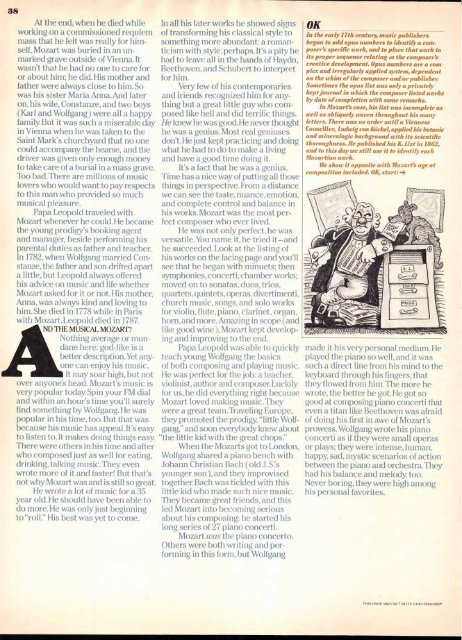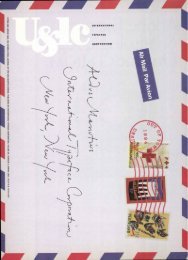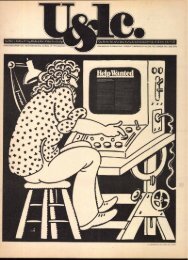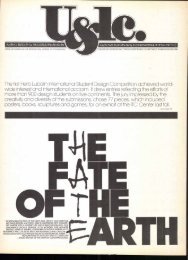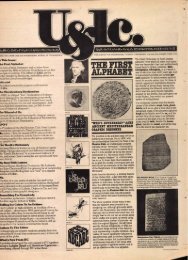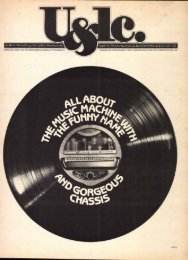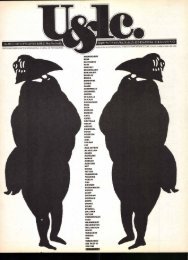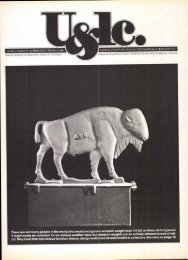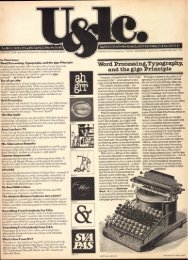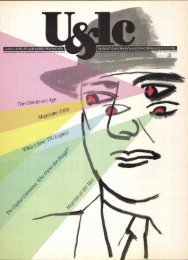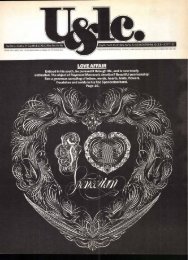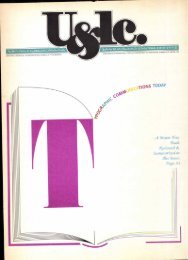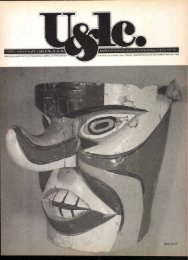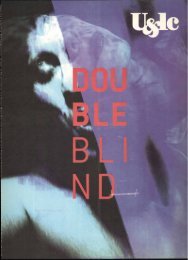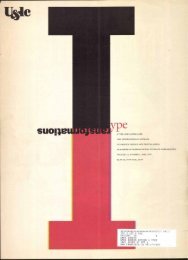Volume 9–2 (Low Res).pdf
Volume 9–2 (Low Res).pdf
Volume 9–2 (Low Res).pdf
You also want an ePaper? Increase the reach of your titles
YUMPU automatically turns print PDFs into web optimized ePapers that Google loves.
38<br />
At the end, when he died while<br />
working on a commissioned requiem<br />
mass that he felt was really for himself,<br />
Mozart was buried in an unmarked<br />
grave outside of Vienna. It<br />
wasn't that he had no one to care for<br />
or about him; he did. His mother and<br />
father were always close to him. So<br />
was his sister Maria Anna.And later<br />
on, his wife, Constanze, and two boys<br />
(Karl and Wolfgang) were all a happy<br />
family. But it was such a miserable day<br />
in Vienna when he was taken to the<br />
Saint Mark's churchyard that no one<br />
could accompany the hearse, and the<br />
driver was given only enough money<br />
to take care of a burial in a mass grave.<br />
Too bad. There are millions of music<br />
lovers who would want to pay respects<br />
to this man who provided so much<br />
musical pleasure.<br />
Papa Leopold traveled with<br />
Mozart whenever he could. He became<br />
the young prodigy's booking agent<br />
and manager, beside performing his<br />
parental duties as father and teacher.<br />
In 1782, when Wolfgang married Constanze,<br />
the father and son drifted apart<br />
a little, but Leopold always offered<br />
his advice on music and life whether<br />
Mozart asked for it or not. His mother,<br />
Anna, was always kind and loving to<br />
him. She died in 1778 while in Paris<br />
with Mozart. Leopold died in 1787.<br />
ND THE MUSICAL MOZART?<br />
Nothing average or mundane<br />
here: god-like is a<br />
better description. Yet anyone<br />
can enjoy his music.<br />
It may soar high, but not<br />
over anyone's head. Mozart's music is<br />
very popular today. Spin your FM dial<br />
and within an hour's time you'll surely<br />
find something by Wolfgang. He was<br />
popular in his time, too. But that was<br />
because his music has appeal. It's easy<br />
to listen to. It makes doing things easy.<br />
There were others in his time and after<br />
who composed just as well for eating,<br />
drinking, talking music. They even<br />
wrote more of it and faster! But that's<br />
not why Mozart was and is still so great.<br />
He wrote a lot of music for a 35<br />
year old. He should have been able to<br />
do more. He was only just beginning<br />
to "roll." His best was yet to come.<br />
In all his later works he showed signs<br />
of transforming his classical style to<br />
something more abundant: a romanticism<br />
with style, perhaps. It's a pity he<br />
had to leave all in the hands of Haydn,<br />
Beethoven, and Schubert to interpret<br />
for him.<br />
Very few of his contemporaries<br />
and friends recognized him for anything<br />
but a great little guy who composed<br />
like hell and did terrific things.<br />
He knew he was good. He never thought<br />
he was a genius. Most real geniuses<br />
don't. He just kept practicing and doing<br />
what he had to do to make a living<br />
and have a good time doing it.<br />
It's a fact that he was a genius.<br />
Time has a nice way of putting all those<br />
things in perspective. From a distance<br />
we can see the taste, nuance, emotion,<br />
and complete control and balance in<br />
his works. Mozart was the most perfect<br />
composer who ever lived.<br />
He was not only perfect, he was<br />
versatile. You name it, he tried it—and<br />
he succeeded. Look at the listing of<br />
his works on the facing page and you'll<br />
see that he began with minuets; then<br />
symphonies, concerti, chamber works;<br />
moved on to sonatas, duos, trios,<br />
quartets, quintets, operas, divertimenti,<br />
church music, songs, and solo works<br />
for violin, flute, piano, clarinet, organ,<br />
horn, and more. Amazing in scope (and<br />
like good wine), Mozart kept developing<br />
and improving to the end.<br />
Papa Leopold was able to quickly<br />
teach young Wolfgang the basics<br />
of both composing and playing music.<br />
He was perfect for the job: a teacher,<br />
violinist, author and composer. Luckily<br />
for us, he did everything right because<br />
Mozart loved making music. They<br />
were a great team. Traveling Europe,<br />
they promoted the prodigy "little Wolfgang,"<br />
and soon everybody knew about<br />
"the little kid with the great chops."<br />
When the Mozarts got to London,<br />
Wolfgang shared a piano bench with<br />
Johann Christian Bach (old J. S:s<br />
younger son), and they improvised<br />
together. Bach was tickled with this<br />
little kid who made such nice music.<br />
They became great friends, and this<br />
led Mozart into becoming serious<br />
about his composing: he started his<br />
long series of 27 piano concerti.<br />
Mozart was the piano concerto.<br />
Others were both writing and performing<br />
in this form, but Wolfgang<br />
OK<br />
In the early 17th century, music publishers<br />
began to add opus numbers to identify a composer's<br />
specific work, and to place that work in<br />
its proper sequence relating co the composer's<br />
creative development. Opus numbers are a complex<br />
and irregularly applied system, dependent<br />
on the whim of the composer and/or publisher.<br />
Sometimes the opus list was only a privately<br />
kept journal in which the composer listed works<br />
by date of completion with some remarks.<br />
In Mozart's case, his list was incomplete as<br />
well as obliquely woven throughout his many<br />
letters. There was no order until a Viennese<br />
Counciller, Ludwig von &Ache', applied his botanic<br />
and mineralogic background with its scientific<br />
thoroughness. He published his K. List in 1862,<br />
and to this day we still use it to identify each<br />
Mozartian work.<br />
We show it opposite with Mozart's age at<br />
composition included. 0Ic start: -+<br />
made it his very personal medium. He<br />
played the piano so well, and it was<br />
such a direct line from his mind to the<br />
keyboard through his fingers, that<br />
they flowed from him. The more he<br />
wrote, the better he got. He got so<br />
good at composing piano concerti that<br />
even a titan like Beethoven was afraid<br />
of doing his first in awe of Mozart's<br />
prowess. Wolfgang wrote his piano<br />
concerti as if they were small operas<br />
or plays; they were intense, human,<br />
happy, sad, mystic scenarios of action<br />
between the piano and orchestra. They<br />
had his balance and melody, too.<br />
Never boring, they were high among<br />
his personal favorites.<br />
THIS PAGE WAS SET IN ITC CHELTENHAM.'


